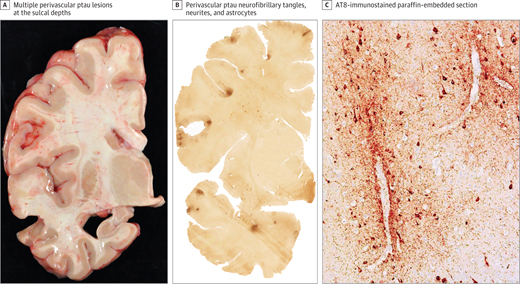New Case Report of CTE in 25-year-old Former Football Player
Chronic traumatic encephalopathy (CTE) is an increasingly recognized neurodegenerative disorder associated with repetitive head impacts, that currently only can be diagnosed by autopsy after death. It has been reported in veterans who have sustained repetitive head injuries and in professional and collegiate athletes from a variety of contact sports including soccer, ice hockey, baseball, rugby and football. Researchers from the Boston University School of Medicine (BUSM) have published in JAMA Neurology the first ever report of a patient with confirmed CTE who had undergone neuropsychiatric testing prior to his death.
 In the article, Ann C. McKee, MD and coauthors discuss a former college football player who experienced more than 10 concussions while playing the sport, the first occurring when he was eight years old. He played football for 16 years, beginning when he was six and including three years of Division I college football. During his freshman year of college, he experienced a concussion with momentary loss of consciousness followed by headaches, neck pain and other symptoms that included difficulty with memory and concentration. He stopped playing football in his junior year because of ongoing symptoms, began failing his classes and eventually left school before earning a degree.
In the article, Ann C. McKee, MD and coauthors discuss a former college football player who experienced more than 10 concussions while playing the sport, the first occurring when he was eight years old. He played football for 16 years, beginning when he was six and including three years of Division I college football. During his freshman year of college, he experienced a concussion with momentary loss of consciousness followed by headaches, neck pain and other symptoms that included difficulty with memory and concentration. He stopped playing football in his junior year because of ongoing symptoms, began failing his classes and eventually left school before earning a degree.
He had difficulty maintaining a job and began using marijuana to help headaches and anxiety and to help him sleep. At age 23, he developed personality changes and became verbally and physically abusive towards his wife. At age 24, he was referred for neuropsychological testing which showed impairment in learning, verbal functioning and executive functioning. He became increasingly dependent on his wife. At age 25, he died of cardiac arrest that was secondary to Staphylococus aureus endocarditis.
 After his death, his next of kin provided consent to study his brain. He was found to have widespread changes throughout his brain consistent with CTE. This is the first autopsy-confirmed case to include neuropsychological testing to document the type of cognitive issues that present with CTE.
After his death, his next of kin provided consent to study his brain. He was found to have widespread changes throughout his brain consistent with CTE. This is the first autopsy-confirmed case to include neuropsychological testing to document the type of cognitive issues that present with CTE.
This report has important implications as it may increase the early recognition, management, and prevention of CTE in individuals who engage in contact sports and in veterans. The authors comment that further studies of athletes with neuropsychological testing will be important to allow for the diagnosis of CTE during life to be made in the future.
Read more
(Mez J, Solomon TM, Daneshvar DH, Stein TD, McKee AC. Pathologically Confirmed Chronic Traumatic Encephalopathy in a 25-Year-Old Former College Football Player. JAMA Neurol. Published online 1/4/16)
Submitted by Dylan Thomas, MD
View all posts